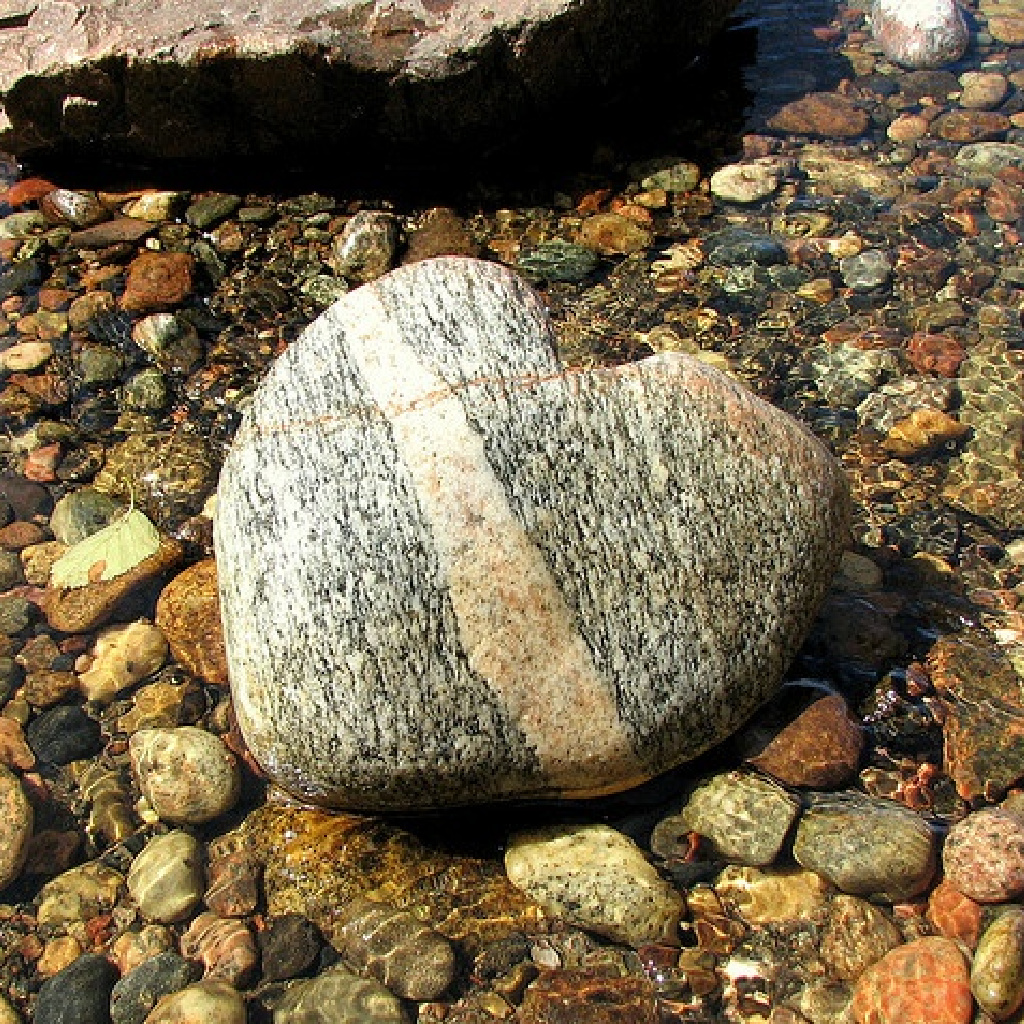A few months ago, two of my children were rummaging through my pantry and discovered a stale candy cane left over from Christmas. This discovery was met with great jubilation—until seconds later, when the battle of ownership commenced. My daughter, age 6, claimed it as her own, for she had moved the cereal box and discovered it. My son, age 8, yelled that he had grabbed it first—and speed should count for something. Luckily, good mother that I am, I came to the rescue—with an unparalleled conflict-resolution device—one which is much under-utilized in our society: You cut, I pick. How many wars could have been diverted with this tactic? One party divides the booty, and the other gets to pick.
But there was an unforeseen snag. In our previous usage of the “You cut, I pick” remedy, soft foods were contested, such as cookies and brownies—so the division was simple. The “cutter” would, with the precision of a surgeon, cut directly down the middle. Candy canes, on the other hand, are not as compliant with such surgery. I quickly came to understand the applicability of the common cliché—“Them’s the Breaks.” Life isn’t fair.
It’s true. It wasn’t fair. Life isn’t fair. This phrase has a familiar ring to me. As the youngest of seven children, this was one of my mother’s mantras. Attempting to divide up resources and favors equally between seven kids was not easy. Even with her attempts to accommodate all our demands for fairness, the nature of life is such that it simply isn’t always possible.
Why is fairness important? We all demand fairness. For some reason, we come into this world thinking it should be just, even though from the very beginning, we can see it isn’t. “I am too small to play—this isn’t fair!” “My younger brother is taller than me—that isn’t fair!” “My sister has better hair than I do. That isn’t fair.” “My friends get cell phones, and I don’t. This isn’t fair!”
In Plato’s Republic, Socrates examines justice. He even builds a city that operates according to perfect justice. When played out in a city, we see that justice must be the motivator for every actor in that city. Justice cannot live in the world unless it lives in each individual in the world.
“Justice in life and conduct of the state is possible only as first it resides in the hearts and souls of the citizens.” ~Plato, The Republic
Much of our injustice, therefore, is our own fault—meaning the fault of mankind. But Plato also recognizes the injustice of life in general. The “gods’ don’t always dish out favors equally or based on merit and need. Life seems arbitrary sometimes. A devoted mother gets cancer; a jerk wins the lottery. These aren’t small things that we can just toss aside with a laugh. However, they are the nature of existence, and wishing it weren’t so doesn’t help.
First, it might help to examine the particular injustice done to us and see if perhaps we may be misrepresenting it. My ten-year-old daughter, for example, gets upset if we ever let her older brother stay up and watch a football game while she has to go to sleep. Yet, if she were open to the truth (as I have tried to explain it many times), the reality is not as unfair as she believes. Unfortunately, kids don’t remember the years before they were born—those two years, he had to go to sleep early while she got to stay up all night in heaven. He also starts school one hour later than she does, so he can sleep in. He has a great passion for football, and she could care less about it. So as a parent, I try to give “good gifts to my children.” I am attempting to be fair to each, but it looks like unfairness to her. For her part, she would rather that no one stays up than suffer this injustice. But demanding that he goes to sleep when she does, is unjust to him.
“For it is not because they fear doing unjust deeds, but because they fear suffering them, that those who blame injustice do so.” ~Plato, The Republic

I have seen women who have a similar mindset towards men. They see that historically women did not hold many positions of power, that women did not go explore new lands, they didn’t get to study under the Masters in Florence—and they see this as evidence of oppression by men. Wicked men were oppressing women for their advantage. There certainly were, and still are, evil men who oppressed and persecuted women—but is that the whole story? Many Gender Studies professors suffer from the same disadvantage as my daughter—they don’t remember the way things were and don’t seem overly concerned with understanding intricacies. Not having birth control or menstrual products had a big influence on what women could do. Our technological advances and education have brought freedom for women that was impossible in previous generations. Women’s relative physical weakness has become less important in these comparatively safe times, allowing women more freedom of movement. As the value of children decreases, women make different life choices. So perhaps, with a more complex and open-minded investigation, we may understand that the inequality we see historically between the sexes was not entirely due to the free choice of evil men but more a function of the nature of reality—and even sometimes out of a desire to protect women. Much of injustice is the fault of mankind.”
When we examine injustices in our lives, we seek meaning—we seek a reason and a cause. Sometimes those examinations end in disappointment as we realize “them’s the breaks.” For example, I recently found the book The Gruffalo on my bookcase—a book I had read at least 100 times to my oldest son when he was a toddler. He would ask me to read it to him again and again. I got so sick of reading that book! But I did it because it brought him so much joy. After finding it, I showed it to him so we could reminisce about those days. My son, now 12, could not remember the book at all! At all! Upon this realization, It seemed like all those hours of self-sacrifice dissipated into thin air. So much of mothers’ hardest work: dirty diapers, early morning feedings, potty training trauma—they are all forgotten and unappreciated. Our child loses memory of our hard work, and they never look back to ask how they know to use the toilet or why they have the habit of brushing their teeth. I tried to recount to my son all the hours we had spent reading that book—seeking some kind of appreciation, but I could see it fell on deaf ears. My credit was gone with his memory. I felt the harsh unfairness of it all. No wonder mothers have such a low standing in society—none of these people even remember their own mothers’ greatest sacrifices! I don’t know why we don’t retain these memories of our loving mothers. In the next life, perhaps I will discover a good reason. Maybe being a mother is meant to be selfless—perhaps meaning would be lost if we received admiration or glory. I do trust that those hours were not wasted and that he is the good boy he is, in part, because of The Gruffalo.
“To love is to suffer, and there can be no love otherwise.” ~Fyodor Dostoyevsky
We perceive justice and fairness with such a limited vision. The world cannot be divided down the middle. We develop different strengths, unique experiences, and perspectives precisely because of the unfairness of the world. Do we want to make everything equal? No, and we can’t anyway. My shorter son has developed ball-handling skills that my taller son doesn’t bother with. My daughter’s friends get cell phones, but she has more time to develop her talents and less drama.
“The worst form of inequality is to try to make unequal things equal.” ~ attributed to Aristotle
So we see that fairness is not easily discerned by us—my daughter still can’t comprehend it after many attempts to explain it. That is because we don’t have the big picture. We can’t see the end from the beginning. We don’t see what we really need or how the unfairness now may be for our benefit. But we can trust that our Transcendent God does know how to dish out justice—now and in eternity. What we are asked to do is simple: “Do unto others as we would have them do to us.” That is how we act in fairness and justice.
Matthew 7:11, 12 says, “If you, then, though you are evil, know how to give good gifts to your children, how much more will your Father in heaven give good gifts to those who ask him! So in everything, do to others what you would have them do to you, for this sums up the Law and the Prophets.
Although life can’t be fair and we are often treated unjustly —we can deal justly. We can treat people the way we want to be treated and teach our children to do the same.
“If it were necessary either to do wrong or to suffer it, I should choose to suffer rather than do it.” ~Plato, Gorgias
If we believe in the eternal nature of our soul, we see that it really doesn’t matter, ultimately, how unjustly others may treat us—only what we do to them. We have faith that virtue will win, and that happiness comes from living virtuously.
“It is a small thing to a man whether or not his neighbor be merciful to him; it is life or death to him whether or not he be merciful to his neighbor.” ~George MacDonald
When I look back at the last 14 years of motherhood, the episodes I most regret usually involve failed attempts to make things fair. In attempting to make everybody happy—more often than not, we end up with everyone unhappy. With different ages, personalities, and preferences, we simply can’t please everyone.
So we end up disappointing one child, and then to make them happier, we disappoint another child. We cannot let our desire to make peace allow us to give bad gifts to our children.
When we discover unfairness—such as the candy cane breaking unevenly—we want to swoop in and try and make things fair. And that is just what I did. I chiseled away at that candy cane to try and make it perfectly even until it was mostly shards and a pile of sugar dust, and both children were crying at the unfairness of life. Fairness is not easily discerned.
If I could do it again, I would have told my son—after some comforting: Them’s the breaks. You chose to cut—and that is how it broke. This is unfortunately how life works out. Sometimes we don’t have as much control as we think. I will not do further injustice to your sister by breaking the code of “You cut, I pick.” It is sad, but at least now you don’t have to ingest as much sugar, which is actually to your benefit.
But instead, my poor daughter wept—her trust in You Cut, I Pick may be gone forever—for I had been unjust and broken the rules of the game. We cannot correct the unfairness of life by perpetrating more unfairness. We cannot bring justice to women by being unjust to men. We cannot make life better for a sorrowful child by taking the joy from a happy child.
So why discuss justice and fairness? Is fairness possible? After all, this is a topic that has confused the world for at least 3,000 years. Because it is important to recognize what we don’t always understand, for acting without understanding can do great damage to the world.
“Human beings are born with different capacities. If they are free, they are not equal. And if they are equal, they are not free.” ~Aleksandr Solzhenitsyn
As mothers, we should seek justice and fairness within our homes. I believe that we have a God-given ability to discern what is best for our children—if we clear our minds of an inordinate need to make everyone happy, we can discover the best path forward in time. I now understand why my mom had to so often turn to the phrase “life isn’t fair.” This was a perspective we children needed, even if it stung a bit. It’s a perspective I still need. As my pile of sugar dust and crying children demonstrate.
















